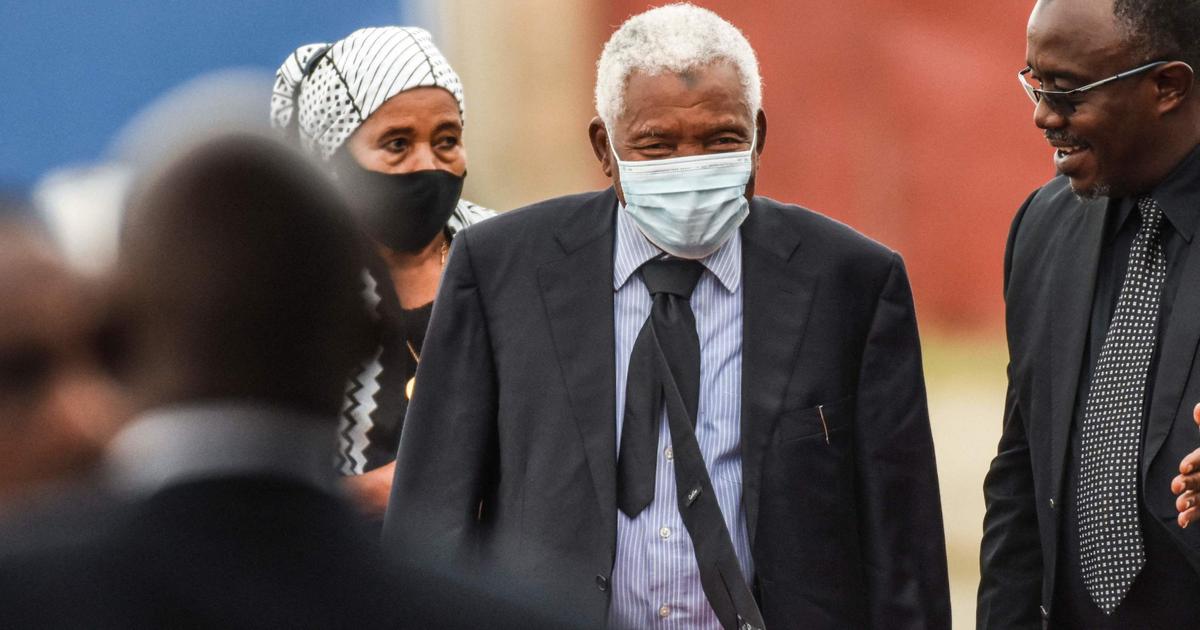Attaching's white Maasai: Lena Schmitt (31) builds a school in Tanzania
Created: 12/25/2022, 5:00 p.m
By: Manuel Eser
She leads the children to education: Lena Schmitt from Attaching is building a school in Tanzania to give the boys and girls a way off the streets.
She drew inspiration for this in 2019 during a voluntary year at a nursery school in Arusha.
The children in the picture are wearing school uniforms.
© Kipepeo Wajanja
Even as a child, Lena Schmitt wanted to help the poor children of Africa.
Now the 31-year-old from Attaching has done impressive things.
Attaching/Arusha
– Lena Schmitt has always been touched by the Black Continent for as long as she can remember.
"When I saw pictures of Africa on television as a child, I always got goosebumps," she reports.
Even then she thought: "When I grow up, I want to help there."
Actually, the attaching woman wanted to go to Africa right after graduation.
But then she got the approval to study psychology faster than expected.
She worked as a psychologist for five years and found fulfillment in her work, but Africa would not let her go.
"In 2019 I made the decision to quit my job," she reports.
Suddenly it was time for a longer journey.
Lena Schmitt researches volunteer positions on the Internet and looks at many organizations.
In the end, she chose the organization Step Africa, which is active in Tanzania.
"I was sure that the donations would really reach the people." For a month she works in a nursery school near the city of Arusha, in a preschool for children between four and six years.
“The children learn the letters and numbers there, including English.
Because that is the be-all and end-all for finding work later in the city – for example in tourism.”
Help as many children as possible
Lena Schmitt returns from Tanzania fulfilled and inspired.
She is now thinking about building a school in Tanzania herself.
"So many children are standing on the street and have to play with stones," she reports.
"I really wanted to make a contribution to change that."
"School enrolment": Lena Schmitt recorded the children's data with her on-site coordinator, Nancy Nashilu (back right in the gray shirt).
Then there was the first “class photo”.
© Kipepeo Wajanja
But nothing will come of the plans any time soon.
The new job, a management position at an early childhood education center, challenges her.
The pandemic also made it impossible to fly to Africa for a while.
Now there are not only 10,000 kilometers between Attaching and Arusha, but also Corona.
When the global situation calms down, it is ultimately her family and friends who give her the decisive boost.
"I was annoying with my talk about the African school until at some point they said: Then do it!" reports Lena Schmitt and laughs.
She conducts property negotiations with the Maasai chief via video link
She uses her contacts to Step Africa and looks for a local German contact person.
Because she's not blue-eyed.
“In this country there is simply a great deal of corruption – also out of necessity,” she reports.
“The people there can be so nice.
If you give them money, you can easily find them gone the next day.”
also read
"It's a shameful situation": Freising's pediatrician speaks plainly about the medical bottleneck
READ
On the trail of a Christmas secret: How the Christmas tree got to Marienplatz in Freising
READ
No firecrackers and rockets: New Year's Eve 2022 fireworks are also prohibited in parts of Moosburg - high penalties
READ
The application documents are on their way: Neufahrn is not far away from the "fair trade community".
READ
Fire alarm in Freisinger department store: large-scale operation in the old town with a minor outcome
READ
Fancy a voyage of discovery?
My space
With the right contact person on site, everything suddenly goes very quickly.
In the summer of 2022, she negotiated via video phone with the Maasai tribe about the purchase of a suitable plot of land near the city.
Talks with the chief are going well.
The attaching woman acquires a 4.5-hectare property for a purchase price of 18 million Tanzanian shillings – the equivalent of 7,250 euros.
The Maasai invest most of the money in buying a tractor for farming.
The vehicle makes it possible for the tribesmen to cover longer distances to find fertile soil in order to plant corn or other crops there.
The acquisition of the property alone becomes development aid.
The foundation stone has been laid: Lena Schmitt will visit Tanzania at the beginning of November to support the construction of the school.
The motto: "Spread your wings and fly away".
© Kipepeo Wajanja
Construction work on the school building, which will include two classrooms and an office, began in November.
Around 120 children will soon be taking lessons here.
"By our German standards, that's a huge number for two rooms," says Lena Schmitt.
“But in Tanzania it is normal.
And I wanted to give as many children as possible the chance to go to my nursery school.”
Workers work alone with picks and shovels
It is also important to the attaching lady that her school is established in cooperation with local people.
"I want to create jobs." There are enough qualified people in the city who are waiting for orders: people who can draw construction plans, who know their way around construction sites, who can teach.
What doesn't exist are power and water lines.
On the one hand, this makes construction an uncomplicated undertaking, or as Lena Schmitt puts it with a wink: "You can't do too many mistakes." On the other hand, no modern machines can be used.
“The construction workers are using picks and shovels.
Everything is done by hand there.” The outhouse on the edge of the property consists of outhouses.
A photovoltaic system is to provide electricity
Including the purchase of the land, the realization of the school costs around 60,000 euros.
To finance the project, Lena Schmitt founded an association in August: Kipepeo Wajanja.
It's Swahili and means "clever butterfly" and fits perfectly with the school project: "Spread your wings and fly away!"
Faster than expected, she collects enough donations for the realization.
"First my family, friends and acquaintances gave money," reports the 31-year-old.
“Then word of the project spread – right down to private individuals who donated a great deal.” She also approaches companies – with success.
Feine Küchen Eberl is sponsoring the school kitchen, and Emondo from Freising is sponsoring a photovoltaic system that is to be installed on the roof of the school, as Schmitt explains: "It is important to me that at least electricity can be generated for computers and printers in the office."
They pull the strings: The construction workers, who mostly work barefoot or with scanty shoes, have to make do without a spirit level or other tools.
Here, in mid-November, you can already see where the windows and doors are.
© Kipepeo Wajanja
School is expected to start in January.
The men also work on Saturdays and Sundays for this.
The workers even spend the night on the construction site in order to save themselves the journey from the city and to be able to grab their tools early in the morning.
Lena Schmitt is also enthusiastic about her on-site coordinator, Nancy Nashilu: “She does an incredible job.” Together they registered for school in November and collected the children's data.
"It's a big thing for them.
They are already standing in front of the school and are waiting.”
Throughout November, Lena Schmitt accompanies the construction of the building on site.
The locals love them.
“At first the children screamed or ran away from me.
You've just never seen a white person," she says, laughing.
“But the women quickly understood that I was behind the school and were very welcoming.
They performed joyful dances for me, hung jewelry on me out of gratitude, and thereby accepted me into their tribe.”
The moms perform joyful dances
Cultural exchange is a matter close to Lena Schmitt's heart.
She would like to do educational work with the locals, for example in relation to HIV and contraception.
And she wants to gently explain to women that genital mutilation is a clear violation of human rights.
"But you can't do that from above, you can only do it by talking to them."
The local women should not only benefit from cultural events, but also from a regional food distribution, which is also planned on the school grounds.
“The life of the Maasai is designed to be self-sufficient.
For this, the women have to put up with long journeys to water points,” explains Lena Schmitt.
“But there is hardly any water left because – due to climate change – it hasn’t rained for months.”
Lena Schnitt needs project sponsors to cover the running costs
In November, Lena Schmitt distributed 150 kilos of beans and 150 kilos of rice to 140 moms.
And she organized another very special fruit from the city.
“The children have never seen a watermelon.
And although everyone only got a small piece, the gratitude was huge.”
Back home, Lena Schmitt also puts almost every free minute into her project in Tanzania.
For you as a full-time employee, this means sitting in front of your computer before 6 a.m. or until 1 a.m. at night, checking construction plans, maintaining the website and thinking about financing models for the future.
Because even if the financing of the school building is as good as covered, the running costs for staff and food must also be borne.
Lena Schmitt has decided on project sponsorships.
If you want to support the school, you can make a monthly contribution from 15 euros.
Among other things, the teachers, who receive a salary of around 120 euros per month, can be paid in this way.
"In Tanzania, that's a good salary," she says.
(By the way: everything from the region is now also available in our regular Freising newsletter.)
What else do you need besides staying power, financial support and a lot of heart and soul to tackle a project like this?
Lena Schmitt does not have to think twice.
"A dose of courage.
That's why I'm very grateful for the support of my partner, my family, friends and work colleagues.” And that's why she doesn't regret for a second having followed her inner voice, which has accompanied her since childhood.
On the contrary: "It's the most meaningful thing I've ever done in my life."
If you would like to support the project: Further information is available on the association's website.









